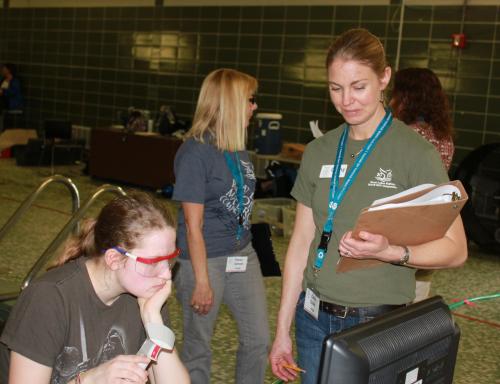4-H Youth Participate in the 2013 Great Lakes Regional MATE ROV Competition
4-H Youth are learning more about robotics and underwater innovation through ROVs.
The 2013 Great Lakes Regional MATE Remote Operated Vehicles (ROV) Competition, hosted by the Thunder Bay National Marine Sanctuary and Alpena Community College encouraged youth to use their critical thinking, problem solving and decision making skills. Three 4-H ROV clubs competed in missions that simulated real world situations. The missions consisted of distinct tasks. For example, this year Ranger classes (or “companies”) had four distinct tasks:
- Task one: Complete a primary node and install a
 scientific instrument on the seafloor
scientific instrument on the seafloor - Task two: Design, construct and install a temperature sensor over a hydrothermal vent opening, and measure temperature over time
- Task three: Replace an Acoustic Doppler Current Profiler (ADCP) on a mid-water column mooring platform
- Task four: Remove biofouling from structures and instruments within the observatory
Each team had 15 minutes to complete these tasks, and could have up to two attempts to complete their “Mission.”
Michigan State University Extension says that in addition to engineering and operating their ROVs, students prepared technical reports, poster displays and engineering presentations that they delivered to working professionals (who served as competition judges). This included in-depth discussions of their team’s engineering plans and the various iterations that led them to an efficient final design.
The competition was intentionally designed to connect students with employers and professionals from the workplace. It also exposed students to ocean related career opportunities and helped them to see the pathways to those careers. According to the Centers for Ocean Sciences Education Excellence (COSEE), the “ocean economy” accounts for 20 percent of our national economy and supports one in six jobs in the United States. Marine technology and ROV’s play a vital role in supporting the ocean economy, from national security to transportation and commerce, energy and exploration activities, telecommunications, recreation and tourism, fisheries and aquaculture, search and recovery, environmental assessment and regulation and research.
According to information on the MATE Center web site, although the ROV technology is diverse, the basic underpinnings, robotics, engineering and technology have many similarities. Youth researching this technology found that there is a great need for highly qualified technical professionals. They need to have to an aptitude for designing, building, operating and maintaining these science, technology, engineering, and mathematics (STEM) technologies.
The good news is that Michigan STEM, the Thunder Bay Marine Sanctuary and local business partners have recently formed partnerships in order to offer ROV training and equipment to 4-H clubs. This is being offered to youth and mentors across the 26 Northern lower peninsula counties of the Straits STEM hub.
In addition, several Michigan 4-H Clubs plan to offer ROV building sessions during county fairs summer 2013. This will allow local youth to decide if this type of 4-H programming is fun, interesting and will be beneficial to expand later in the club year.
Currently, staff are recruiting local mentors and volunteers to lead new 4-H STEM/Robotic Clubs, or incorporate this technology into their existing 4-H Clubs. Mentors are not required to have an engineering or technology background in order to volunteer. Similar to all 4-H program areas, mentors simply need to be curious and have the desire to learn more about ROV’s and associated STEM technology.
If that news isn’t exciting enough, the Marine Technology Society (MTS), who plays an active role in helping students get involved in marine technology and careers at a young age, is offering scholarships, internships, travelships, and information about student competitions around the world. MTS also provides opportunities for students at institutions of higher learning to network with each other and with other professional members through its many student sections. For more information, visit: http://www.facebook.com/pages/mts-Ocen-Explorers/155062187858116 .
For more information on the 4-H ROV Training, contact Melanie Chiodini at 231.627.8815, chiodin1@anr.msu.edu, or email: msue4h@msu.edu Phone: 517-432-7575.



 Print
Print Email
Email


